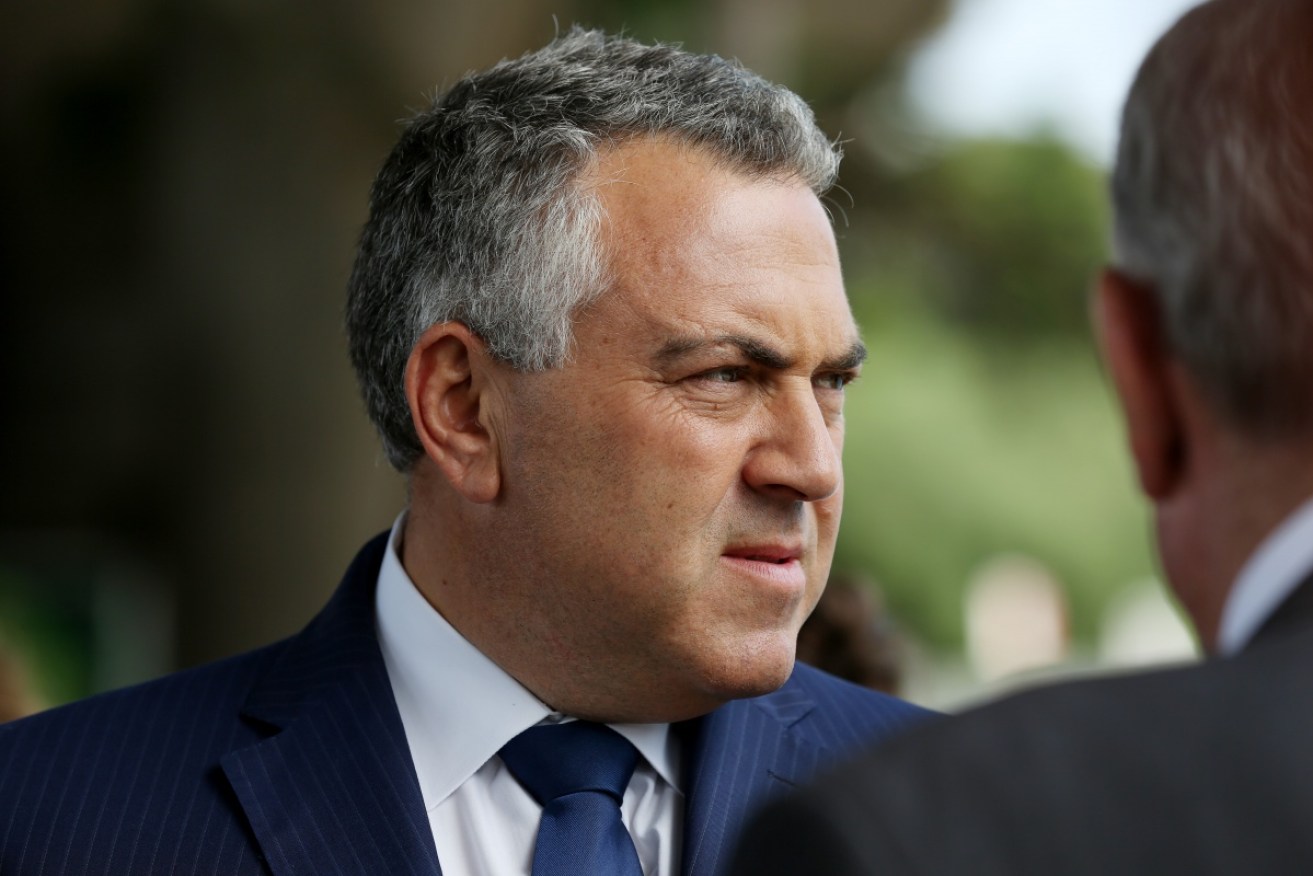Is there method in Hockey’s house price madness?


AAP
The penny appears to be dropping for the Abbott government – it has an economic problem on its hands, not a ‘debt and deficit’ problem.
While the government continues to push the debt-and-deficit story – it was the centrepiece of last week’s Intergenerational Report – that very act is putting the economy in an increasingly dangerous position.
In fact, this week’s ANZ-Roy Morgan Research consumer confidence report shows a sharp fall in confidence, and notes that “newsflow around the long-term Federal Government budget outlook (spurred by the release of the Intergenerational Report) likely drove the decline last week”.
• Australian stockmarket falls sharply
• Inside the Treasurer’s bearded-lady economics
• Low rates helping the economy: RBA
The frustrating thing about this situation is that Australia’s economic fundamentals are not in bad shape, as long as a transition from heavy reliance on the resources sector to other sectors can be managed smoothly.
Though the mining boom that was fuelled by China’s stellar growth in recent years is easing, new markets are opening up for exports in sectors such as tourism, education, advanced manufacturing and agribusiness.

New markets are opening up for exports in sectors such as tourism, education, advanced manufacturing and agribusiness. Photo: AAP
And let’s not forget that only around 40 per cent of the economy is in the ‘tradable’ sectors – those geared to exporting or having to compete with imports.
The other 60 per cent depends even more directly on consumer confidence – be it a consumer’s willingness to visit a restaurant, take a taxi, or employ a builder to renovate their home.
Those kinds of spending decisions need to be nurtured.
And no, scrapping the carbon tax did not cause the nation to go on the spending spree some predicted.
The economy is hard to talk up, but easy to talk down – and two potential shocks to consumer confidence remain.
One is a large stockmarket correction, though such an event would likely be driven by global factors, not domestic politics.
The second is a large correction in house prices. And this is the area where Mr Hockey’s recent comments are risky.
Two weeks ago, Mr Hockey released a discussion paper suggesting foreign investors in our housing market be slugged a $5,000 fee for applying to buy a place, with the bulk of the money raised being set aside to police illegal investments in established residential property.
As described at the time, this is an excellent idea in more prosperous times, and a terrible idea when confidence is so shaky – if there really is a big problem with foreigners holding residential property illegally, a mass exodus at this time would send prices plummeting and knock that nervous consumer for six.

Joe Hockey and Tony Abbott have spoken this week about allowing young Australians to dip into their superannuation savings. Photo: AAP
As if to atone for that faux pas, Mr Hockey and Mr Abbott have both spoken this week about allowing young Australians to dip into their superannuation savings to find the deposit for a home of their own.
The idea, in itself, is self-defeating.
The affordability problem in residential property would be made worse by allowing people to borrow more and bid prices up still further.
However, there may be method behind Mr Hockey’s madness.
The Treasurer may at last be starting to understand the precariousness of an economy balanced on a massive stock of private debt.
While it would be unwise to actually allow youngsters to splash their retirement savings about, just talking about it has the effect of kicking the private debt problem along the street a bit to deal with on another day.
What private debt problem? Well actually it’s so big it can be hard to see.
Debt figures are often quoted in nominal dollars, and where they are aggregate figures, fail to account for Australia’s rapid population growth over the past decade (see, for instance, the chart below showing the stock of mortgage debt held by owner occupiers).
Those comparisons are not useless, but can be misleading. A more accurate comparison is to calculate a per capita figure, and then adjust for inflation.
And when we do that with private debt, the results are scary.
Because as the chart above indicates, Australians really learned how to borrow just after the bursting of the ‘dotcom’ bubble in early 2000.
Private debt soared, but real incomes did not.
To make the comparison clear, all figures below have been adjusted for inflation to be in 2014 dollars.
Between 2000 and the end of 2014, average total earnings per person per week increased from $939 to $1128, or a real increase of 20 per cent.
Total workforce participation lifted slightly – from about 63 to 65 per cent, but not enough to justify a huge blow-out in debt.

Will the the super-into-housing-debt plan work? Photo: Shutterstock
However, at the same time, that’s exactly what the total stock of private debt did.
In 2000, our debts averaged over every man, woman and child, came to $53,300. And now it’s $99,400 – a real increase of 87 per cent.
That’s earnings up 20 per cent, debt up 87 per cent.
Of that debt stock, about 50 per cent is held as owner-occupier mortgages and about 35 per cent as ‘other’ housing loans, meaning second mortgages to fund investment properties or to fund small businesses.
Allowing the market to fall would be a disaster.
Labor faced the same problem in 2009, but successfully pumped up prices with the First Home Buyer’s Grant.
Now the Coalition, in a similar vein, is weighing the super-into-housing-debt plan.
Will it work? Hard to say, but the best result for the Coalition would be a house price correction after the 2016 election – and not before.
One has to wonder whether they can talk things up that long.









